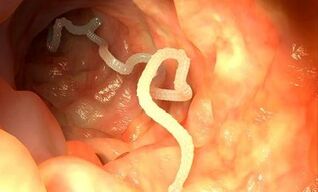
What are worms? Worms are scientifically called helminths. Helminths are all the worms that parasitize human, animal and plant organisms. As a result, worms are not a specific type of parasite, but a whole group of different worms, of which three are the most common.
Some scientists claim that almost the entire population of Earth is infected with one or another of the parasitic worms. However, in this case, helminthic infestations are expected to be the most common types of disease around the world. In addition, a number of serious studies prove that in fact everything is not so bad. But the thought that helminths are always present in a person immediately prompts him to seek an answer to the question of how to get rid of worms.
It should also be understood that helminthic invasion is still not something rare and trivial. There are more than three hundred species, the larvae in humans not only enter the intestines and continue to develop there, gradually poisoning the body. Let's see what are the symptoms of parasites in humans, because the defendant, as you know, is armed. And then we'll learn how to effectively get rid of worms and what it takes to keep them from coming back.
What's the danger of ignoring?
It is actually very easy to determine the presence of parasites in a person's body - all you need to do is take a stool test. The problem, however, is that most people don't even think about getting tested. The problem is that helminths in adults and children manifest themselves, disguising themselves as a large number of diseases, and at first they do not betray their presence at all. A person can heal the intestines, liver, kidneys, stomach, gallbladder for years, and the root of the evil will be helminthiasis and parasites, which feel great when not fought.
Often times, helminthic invasion causes the development of diseases that have nothing to do with the helminths themselves. And in this case, you can be treated endlessly, if you do not understand in time what the problem is.
All of this proves that worms aren't just a nasty phenomenon. And given the presence of a large number of infection pathways, knowing the signs of worms in humans is vitally important.
Paths of infection
How do parasites get into the human body? Worms in an adult, we will consider their symptoms a little later, start from four main sources. Their list looks like this:
- Soil-transmitted helminthiasis- in this case, the helminth eggs are transmitted through the soil. It happens in a circle. First, the wastes of a person, animal or bird, infected with mature eggs, appear in the soil. Then they end up in our hands, the food. The next destination is the mouth, then the intestines, where the worms hatch and begin to grow. Insects also play an active role in the transfer of eggs (for example, flies, with them parasite eggs can fly long distances) and pets, whose dirty wool we iron. In addition, everything is extremely simple.
- Contact helminthiasisis a route of transmission from one person to another, as the name suggests, through different contacts. In this way, for example, pinworms move.
- Biohelminthiasis- despite people's love for delicious dishes, situations often arise when meat or fish is not fully cooked. For example, we all love kebabs, now Japanese cuisine, which involves the use of raw fish, has gained immense popularity. These products, if infected with parasites, become their suppliers for the human body. As a result, we get helminthiasis, the symptoms of which will be discussed below.
- Insects- this route of infection is the rarest on the list, however, it should not be excluded or ruled out.
No treatment for worms will be effective enough if a persistent source of infection is not excluded. The point is that in order for new individuals to appear in the human body, it has to somehow swallow them. Otherwise, the parasite eggs that came out with feces will stay there, unable to return.
Why do worms appear? They cannot reproduce inside the body, the eggs have to leave it temporarily for maturation to take place. At the same time, the worms themselves in humans, the symptoms of which are very important to know, do not live long, some - only a few weeks.
If everything is clear about how groundworms get into a person, then I would like to talk in more detail about contact infection. Pinworms are usually spread this way. At night, the female leaves the intestines and lays thousands of eggs near the anus. They quickly start to be annoyingly itchy, causing the person to scratch the area without knowing it. As a result, the eggs fall under fingernails, on clothes, on the bed - and everywhere else. So how do you tell if a person has worms? Observe his behavior carefully. This will help to notice the first signs of worms and start the surgical treatment of helminthiasis. This method of infection is especially common in children.
Water is another medium that contributes to the spread of helminths. Everything here looks like the ground. The eggs of the worms, which we will talk about later, fall into the water and the person drinks them. Therefore, you should never swallow fluids while swimming in open water. It is necessary to use germicidal filters, especially in villages without running water.
Signs

Symptoms of parasites in an adult can vary. As mentioned above, they are often easy to confuse with signs of other illnesses. In some cases, everything goes according to the classic scenario of a massive infection. In this case, the signs of worms in an adult and a child will be similar, most likely in children - more pronounced.
Obvious symptoms of worm infestation:
- Itching in the anus, especially at night;
- sudden weight loss or vice versa;
- anemia, manifested externally in the pallor of the skin;
- looks tired and haggard.
If you or your children start to experience such phenomena, it is imperative to see a doctor and insist on being tested for the presence of parasite eggs in the stool. Of course, it may not be them. Symptoms of helminthic invasion are not always to blame for feeling unwell, but communication with a doctor will help in any case, as the disturbances in the body are evident.
Unfortunately, things are not always that simple. Next, we will talk about the symptoms of helminthiasis in adults and children, which are not obvious.
Gastrointestinal tract
How to know if a person has worms or not, if they are in the intestines? The signs of the appearance of parasites in this case are as follows:
- diarrhea;
- constipation;
- flatulence;
- nausea;
- vomiting;
- abdominal pain, often localized to the navel;
- painful right hypochondrium.
These symptoms of human worms do not naturally appear at the same time. However, constipation can easily be replaced by diarrhea within a few days, so you need to carefully monitor your health. Moreover, with parasites, health does not always have to be bad. There are days when a person seems to be in perfect health.
Nervous system
Parasites in humans, on the symptoms and treatment we are talking about, during their life, like any living thing, release waste. These are toxic substances that gradually infect our body. A worm infestation often develops as a result. But even if this does not happen, the condition of the person can only worsen due to the constant presence of toxins. Especially, in this case, the nervous system suffers, which is sensitive to general intoxication of the body. Symptoms become more pronounced with the presence of parasites.

Signs of the presence of nervous system worms are as follows:
- headache (even so severe that it looks like a migraine);
- nausea;
- long-term low-grade fever;
- chronic fatigue;
- drowsiness;
- irritability;
- anemia;
- sleep disturbances, insomnia, nightmares.
Oddly enough, but the signs of worms in adults are even problems at work, which occur as a result of lack of sleep, deterioration in concentration, flare-ups or aggression. 'apathy. Children may have reduced academic performance.
Skin reactions, allergies
How to identify worms in a person by the condition of their skin? It would seem, what kind of connection can there be? Can you somehow tell if a person has worms? In fact, in view of the development of the same intoxication of a person, his appearance also suffers. The following signs are signs of infection:
- presence of rash;
- itching;
- hives;
- allergic rhinitis;
- peel the nails;
- brittle hair;
- dry cough.
Many people have noticed that these signs of helminth infection go away without a trace, as soon as they start to be eliminated from the body by various means.
If you are unsuccessfully drinking state-of-the-art vitamins and none of the negative manifestations from the above list have gone away, it is time to have a stool test. You may have to buy completely different drugs from the pharmacy.
Immune system
Due to the severe intoxication of the body, the immune system can only suffer. What signs indicate a weakening of the body's defenses? Of course, first of all, it is about the vulnerability of a person to various infectious diseases, as well as a sudden exacerbation of chronic diseases. Those who suffer from helminthiasis often have stomatitis, they also note various inflammations in the nasopharynx. It is believed that even many inflammatory processes in the female reproductive system are caused by parasites.
After all of the above, it becomes more than clear that identifying a problem quickly will help save a person from very unpleasant consequences. How do you know if there are worms, with one hundred percent accuracy? Contact a specialist and pass the simplest analysis. It won't take a long time, but it will rule out or confirm the diagnosis.
Processing
Parasites are easily eliminated from the body. There is a small list of drugs that affect them. The difficulty here is determining which parasite is being treated. Unfortunately, it is not possible to do this on your own, so you will have to see a doctor.
The goal of treating worms for adults and children is to take anthelmintics. They must be dosed with care as they are toxic in themselves. Overdose is especially dangerous for babies.

How to get rid of worms in humans without resorting to drugs? There are a number of folk remedies that have long established themselves as effective fighters against parasites. One of the best known are pumpkin seeds. It is very important to buy them unroasted and uncooked. The point is that a big advantage of milking is the thin films that are removed with the pod. Treatment of worms involves long and regular use of seeds. You should eat at least 300 grams each morning.
How to get rid of worms with carrot juice? It should be drunk freshly squeezed and on an empty stomach - one glass every day. For more efficiency, you can add a little chopped garlic. The treatment lasts up to a month. However, doctors believe that it will not give the desired result without simultaneous drug treatment.
Treating worms with garlic gives good results. You can make a special broth with milk. A glass of the latter will require two large cloves. Milk should be boiled for 15 minutes, then drink a tablespoon once a day. The treatment lasts about two weeks.
Much has been written about how to treat worms with hemp oil. It is an excellent remedy for children who receive it simply with bread.
You can also read how to get rid of worms by doing medicinal enemas. However, doctors do not recognize this method. The enema simply does not affect the areas of the intestine where most of the parasites live.
Before treating worms using traditional methods, you should consult a doctor and find out which plan to treat them is better to choose. Most likely, the specialist will advise you on drugs that can be combined with the above methods. In general, folk remedies are essential for prevention.
You can write as much as you want about how to cure worms, but none of the methods will work if you don't follow basic hygiene standards, in which case they will stably reappear. After all, protecting yourself from pests is actually very simple. So, we figured out how to get rid of worms in adults and children.
















































